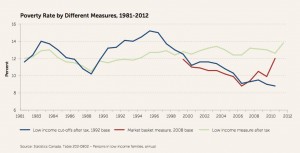 In a wealthy country like Canada, it is difficult to comprehend why nearly 4.8 million people – one in seven – continue to live in poverty and struggle to pay their rent, feed their families, and meet their basic needs. A national anti-poverty group is highlighting this issue by calling on the federal government to take immediate steps to eradicate their cause. Canada Without Poverty and Citizens for Public Justice, the organizers for the anti-poverty campaign called Dignity for All, have released a national anti-poverty plan. The national plan provides the government with a concrete set of recommendations focusing on six different aspects of addressing poverty:
In a wealthy country like Canada, it is difficult to comprehend why nearly 4.8 million people – one in seven – continue to live in poverty and struggle to pay their rent, feed their families, and meet their basic needs. A national anti-poverty group is highlighting this issue by calling on the federal government to take immediate steps to eradicate their cause. Canada Without Poverty and Citizens for Public Justice, the organizers for the anti-poverty campaign called Dignity for All, have released a national anti-poverty plan. The national plan provides the government with a concrete set of recommendations focusing on six different aspects of addressing poverty:
- Income security
- Housing and homelessness
- Health
- Food security
- Early childhood education and care, and
- Jobs and employment
 According to Dignity for All, not doing anything about poverty will actually end up costing more than doing something about it. Poverty has been linked with poorer health, higher health care costs, and greater demands on social and community services. For example, the National Council of Welfare estimates that poverty costs taxpayers more than $24 billion a year. Furthermore, the Canadian Alliance to End Homelessness has tallied the total annual cost of homelessnessas $7 billion, including the cost of emergency shelters, social services, health care, and corrections.
According to Dignity for All, not doing anything about poverty will actually end up costing more than doing something about it. Poverty has been linked with poorer health, higher health care costs, and greater demands on social and community services. For example, the National Council of Welfare estimates that poverty costs taxpayers more than $24 billion a year. Furthermore, the Canadian Alliance to End Homelessness has tallied the total annual cost of homelessnessas $7 billion, including the cost of emergency shelters, social services, health care, and corrections.
The plan is careful to make a key distinction of approaching this issue from a human rights perspective as opposed to the notion of being charitable to the underprivileged. Within this framework, poverty can be seen as a violation of Canada’s global human rights obligations which, provides a powerful mandate for action.
What about poverty and disability? How are they related?
People with disabilities –including people living with mental illnesses – are especially hard hit by poverty and, are generally poorer than non-disabled Canadians. For example, the poverty rate for people diagnosed with psychological or cognitive disabilities is more than 22 percent compared with less than 10 percent for people with no disability.
Reasons for this can be quite complex. People with serious mental illness face many barriers over their lifetime, including stigma and discrimination, social isolation and exclusion from social supports. All of these factors may prevent them from securing adequate education and employment. For example, people with schizophrenia are four times more likely to be unemployed or partly employed and one-third more likely not to have graduated from high school.
Conversely, a growing body of research shows that the reverse can also be true: being poor is in itself a risk factor for mental illness. Studies by Dr. BenedettoSaraceno, for example, show that the poorest Canadians have eight times more relative risk for developing schizophrenia than those who are wealthiest. Further research suggests a similar relationship between poverty and other mental health conditions.
So, for people with mental health issues, having a disability can often lead to poverty while being poor intensifies the impact of mental illness, generating a vicious cycle.
CMHA Ontario is active in supporting persons with mental illness to reduce their risk of falling into poverty. We do this by advocating for increases in supportive housing, more employment support programs, and raising income support to reflect the actual cost of living. In addition, we promote mental health by identifying public issues and recommending options that can create supportive environments, and by advocating for healthy public policies that address the broad determinants of health. Read more about our work in this area our website.